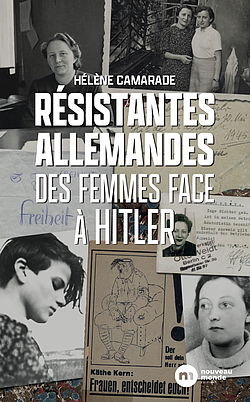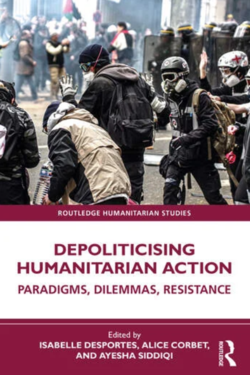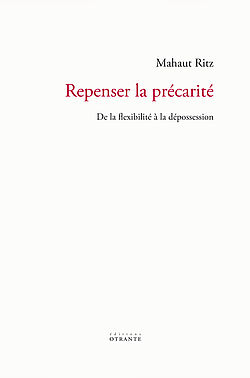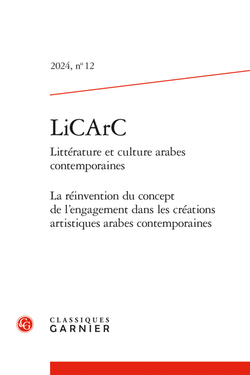Publikationen
Knowledge as a Weapon. Parisian Workers Quantitative Surveys and Epistemic Theory (1840-1848)”
24.Februar 2025Piguet, Laure, “Knowledge as a Weapon. Parisian Workers Quantitative Surveys and Epistemic Theory (1840-1848)”, Labor History, (online first) (2025): 1-16.
https://www.tandfonline.com/doi/full/10.1080/0023656X.2025.2479714

Benjamin, Deleuze and the Baroque The Early Modern Origins of Media Theory
06.Februar 2025 Politische PhilosophieEdition: 1st
ISBN: 9781350414211
For Walter Benjamin and Gilles Deleuze, who both authored seminal theoretical works on early cinema and photography, the history of modern media begins much earlier, in Baroque culture and science. Benjamin, Deleuze and the Baroque argues that their media theories were informed by their respective readings of the philosophy and mathematics of G.W. Leibniz, and the Baroque can thus be seen as the locus of modern media.
By critically comparing Benjamin and Deleuze's interpretations of the Baroque, Levin demonstrates the extent to which their theories of visual culture are intertwined with critiques of Enlightenment historiography and politics. Using a hermeneutic comparative approach, this book argues that the juxtaposition of Benjamin's reception of Leibniz with Deleuze's highlights the extent to which both authors' theories of image and media were informed by Leibniz's concepts of expression and perspectivism, themselves inspired by ground-breaking evolutions in optics and perspective. Providing close readings of Deleuze's The Fold and Benjamin's Origin of the German Trauerspiel, which remain understudied in the English language, it explores how, in their dual roles of philosopher and cultural critic, the pair may illuminate our own age of multiple crises through the Baroque.
Table of Contents
Introduction
I. A Strange Encounter
II. Redefining the Baroque
III. Leibniz, Paradigmatic Baroque Philosopher
Chapter 1: Of Monads and Mirrors: Leibniz's Monad in Deleuze and Benjamin
1.1 The Structure of Expression
1.2 Leibniz's Two Labyrinths
1.3 A Forbidden Tradition
1.4 Continuity of Knowledge and Experience
Chapter 2: Infinite Tasks of Learning: The Baroque-Inspired Critical Epistemologies of Benjamin and Deleuze
2.1 Infinite Analysis
2.2 Refiguring the Idea
2.3 The Concept of Origin
2.4 Minute Perceptions
2.5 Learning as Recollection
Chapter 3: Forces of History and Spectres of Return: The Baroque as Origin of Enlightenment Politics and Historicisms
3.1 Leibniz's Concepts of Force and Historical Progress
3.2 Virtual Histories and Infinite Totalities
3.3 Force and Violence in Origin of the German Trauerspiel
3.4 Apokatastasis and Eternal Return
3.5 Benjamin and Mallarmé on Chance and Probability
Chapter 4: It's All about Perspective: The Body Politics of the Baroque Image
4.1 Benjamin's Monadic Montage
4.2 Leibniz's Conceptions of Image and Perspective
4.3 Perspectivism and Mannerism
4.4 Allegory and Symbol
4.4 Perception and Body
Chapter 5: From the Crystal Palace to Cinematic Crystals: The Baroque Optic as Pre-cinematic Form
5.1 Between the Dialectical Image and the Crystal-Image
5.2 Deleuze and Benjamin on Montage and Montrage
5.3 The Crystal Pyramid, Leibniz's Theodicy
Conclusion

Résistantes Allemandes. Des femmes face à Hitler
05.Februar 2025 MonographieEdition: Nouveau Monde Éditions
ISBN: 9782380946475
L’histoire de la résistance des Allemandes face à Hitler s’est diffusée surtout via la figure emblématique de Sophie Scholl et de la Rose blanche. Mais de nombreuses femmes se sont engagées contre le régime national-socialiste : avocates, féministes, communistes, aristocrates, membres de l’Orchestre rouge ou encore protestantes. Ce livre retrace les histoires aussi méconnues qu’extraordinaires de neuf résistantes aux origines et parcours différents, mais portées par un même combat.
Que ce soit en refusant de porter l’étoile jaune, en aidant d’autres femmes en prison ou dans les camps, en rédigeant des tracts, en aidant des Juifs ou en participant à la conspiration ayant mené à l’attentat du 20 juillet 1944 contre Hitler, elles ont été des actrices à part entière d’un mouvement dont l’Histoire n’a souvent retenu que des noms masculins.
Cette autre histoire de la résistance, nourrie de témoignages et d’archives inexploitées, redonne vie et rend justice à ces combat- tantes qui furent aussi après 1945 des médiatrices de la mémoire.
Hélène Camarade est professeure en études germaniques à l’Université Bordeaux-Montaigne et membre honoraire de l’Institut universitaire de France. Spécialiste de la résistance allemande sous le Troisième Reich et des phénomènes de résistance et d'opposition en RDA, elle a dirigé l’ouvrage Samizdat publié en 2023 aux éditions Nouveau Monde.

Christophe Schlingensief. L'art comme organisme vivant
30.Januar 2025 MonographieÉtudes Germaniques
Edition: Presses Universitaires Rennes
Collection: Études Germaniques
ISBN: 2753596832
Considéré de son vivant comme l’enfant terrible du cinéma et du théâtre allemands, Christoph Schlingensief (1960-2010) est demeuré jusqu’à ce jour la figure par excellence de l’artiste provocateur. Voici la première monographie en langue française sur l’œuvre d’un artiste qui appartient au panthéon du théâtre allemand contemporain, mais reste méconnu du public francophone. S’appuyant en outre sur des entretiens inédits avec ses collaborateurs directs, cet ouvrage aborde toutes les productions de Schlingensief : du cinéma au théâtre et à la performance, en passant par l’opéra.
À la lumière du concept d’organisme vivant, dont Schlingensief poursuit sans répit l’exploration, cet ouvrage saisit les différentes modalités d’interactions entre acteurs et spectateurs, œuvre et « milieu » dès ses premiers films et mises en scène à la Volksbühne en 1993.
Schlingensief a innové dans de nombreux domaines, tant pour la constitution de son équipe, mêlant acteurs professionnels et amateurs, certains en situation de handicap, que diverses formes performatives. Abolissant la frontière entre fiction et réel, il crée un parti politique ou un spectacle de télé-réalité avec des demandeurs d’asile.
À l’annonce de son cancer, le provocateur se trouve à son tour provoqué par la maladie, devenue réalité incontrôlable. Schlingensief fait alors de lui-même et de sa mort l'ultime matériau de son art.
"Decolonization of Migration in Divided Berlin: Berliner Künstlerprogramm and Artistic Representations of Migrant Subjectivities in the 1970s"
07.Januar 2025 Artikel (Online)Nazan Maksudyan, "Decolonization of Migration in Divided Berlin: Berliner Künstlerprogramm and Artistic Representations of Migrant Subjectivities in the 1970s", in: TRAFO – Blog for Transregional Research, 07.01.2025, https://trafo.hypotheses.org/54104

Depoliticising Humanitarian Action - Paradigms, Dilemmas, Resistance
01.Januar 2025
Isabelle Desportes
, Alice Corbet, Ayesha Siddiqi (Editors)
Edition: Routledge
ISBN: 9781032535098
Is it ever possible to separate humanitarian action from politics? Drawing on the experience of both practitioners and researchers, this book is an essential guide to the thorny interplay between what are too often considered as separate worlds.
The humanitarian sector aims to separate its work from politics, arguing that independence and neutrality are essential in order to gain entry into disaster and conflict settings. Yet, humanitarian claims of non-involvement in politics have also been dismissed as misleading, naive, or counter-productive. In practice, humanitarians find themselves working within political settings on a daily basis. This book investigates the theory behind depoliticisation, the political background and context behind humanitarian action, and the daily dilemmas faced by practitioners walking that fine line between principles and pragmatism. Finally, this book considers the importance of decolonising mainstream understandings of humanitarianism and politics, and of placing understandings from the Global South at the heart of the discussion.
Balancing theoretical insights with empirical grounding, field examples, and recommendations for policy and practice, this book is perfect for researchers and students in humanitarian studies, political science, international relations, human rights, development studies, disaster studies, and peace and conflict studies, as well as humanitarian practitioners and policy makers.

Repenser la précarité - De la flexibilité à la dépossession
01.Januar 2025 Edition: OrtanteSi l’on s’attache aux mots, il n’existe pas de « précarité » avant les années 1970. C’est à cette période qu’est thématisé pour la première fois, au moyen de ce terme, le problème de la qualité de l’emploi et de l’instabilité des conditions sociales d’existence. Dans les faits pourtant, la précarité existe dans les sociétés occidentales capitalistes avant les années 1970, et dans d’autres espace-temps. Ils sont le théâtre des conditions assujettissantes du travail et de la vie en société. Qu’ont alors de spécifique les formes d’organisation « précaires » de nos sociétés contemporaines ?
Cet ouvrage repart du contexte qui voit émerger la notion de « précarité » et la rattache à nouveaux frais à la flexibilité néolibérale dont elle est le pendant. Il revient sur les différents diagnostics émis au cours du temps par différents acteurs, à commencer par les sociologues. Mais l’enjeu n’est pas seulement diagnostique, il est aussi critique, car la « précarité » dénonce les conditions dégradées qu’elle cherche à saisir. Or, formuler une critique exigeante de la précarité implique, au regard d’une tradition philosophique qui s’interroge sur le sens de l’émancipation, que certains modèles critiques sont plus pertinents et efficaces que d’autres.
À la croisée de l’épistémologie des sciences sociales et de la philosophie sociale, cet ouvrage analyse et évalue différents modèles historiques de la critique de la précarité et invite à la reconsidérer au prisme de la dépossession.
Ouvrage publié avec le soutien du Centre Marc Bloch de Berlin et de l’Institut de Philosophie de Grenoble.
Beyond Borders and Binaries: Young Ottoman Women’s Experiments with Gender, Body, and Sexuality in Germany During World War I
01.Januar 2025 Artikel (Online)First World War Studies
Collection: First World War Studies
In contrast to their male counterparts in apprenticeships, secondary education and technical training, there is a gap in scholarship on the education of (Muslim, unmarried) Ottoman women in Germany during the First World War as part of an educational collaboration between two empires. This article presents a wealth of new insights into the lives of this group of young women, based on research into official documentation from the Ottoman Prime Ministry Archives, the Political Archive of the Foreign Office, the Federal Archives in Berlin and the Secret State Archives, supplemented by personal documents and biographical sources. In particular, I focus on the Heidelberg diary of Şaziye Hayri (1899–1994), held from 20 February 1918 to 26 January 1919. The diary offers insights into the experiences of young women in German cities and educational institutions during wartime, thereby enriching our understanding of the interplay of gender dynamics in such exceptional conditions. Furthermore, the diary provides valuable insights into women’s experiences and explorations into gender, body, and sexuality. I argue that these women arrived in Germany with high hopes of achieving emancipation, independence, self-sufficiency, and individualisation. Their emancipated lifestyles during and after the war led them to seek a similar space of freedom in their later lives and helped them develop a more grounded sense of agency and self-respect. Nevertheless, in the context of the rise of fascism across Europe in the 1930s, the anti-intellectual, anti-liberal, and anti-feminist attitudes of these regimes marginalised the contributions and experiences of these women in historical scholarship.

Cartographier la présence-absence L’Alep de Mohammad Al Attar
18.Dezember 2024 ZeitschriftenartikelLiCArC (Littérature et culture arabes contemporaines)
Edition: Classiques Garnier
Collection: LiCArC (Littérature et culture arabes contemporaines)
ISBN: 978-2-406-17538-4
Dans Alep, Portrait d’une absence, Mohammad Al Attar, exilé depuis 2012, fait surgir, par une succession de témoignages, la ville d’Alep, valant pour elle-même mais aussi en tant que métaphore. Mohammad Al Attar pense la représentation spatiale mentale comme « clé symbolique » pour appréhender le déracinement. Les réminiscences « remembrent », au sens rimbaldien, le pays d’autrefois, en révélant les contours du fantôme actuel.